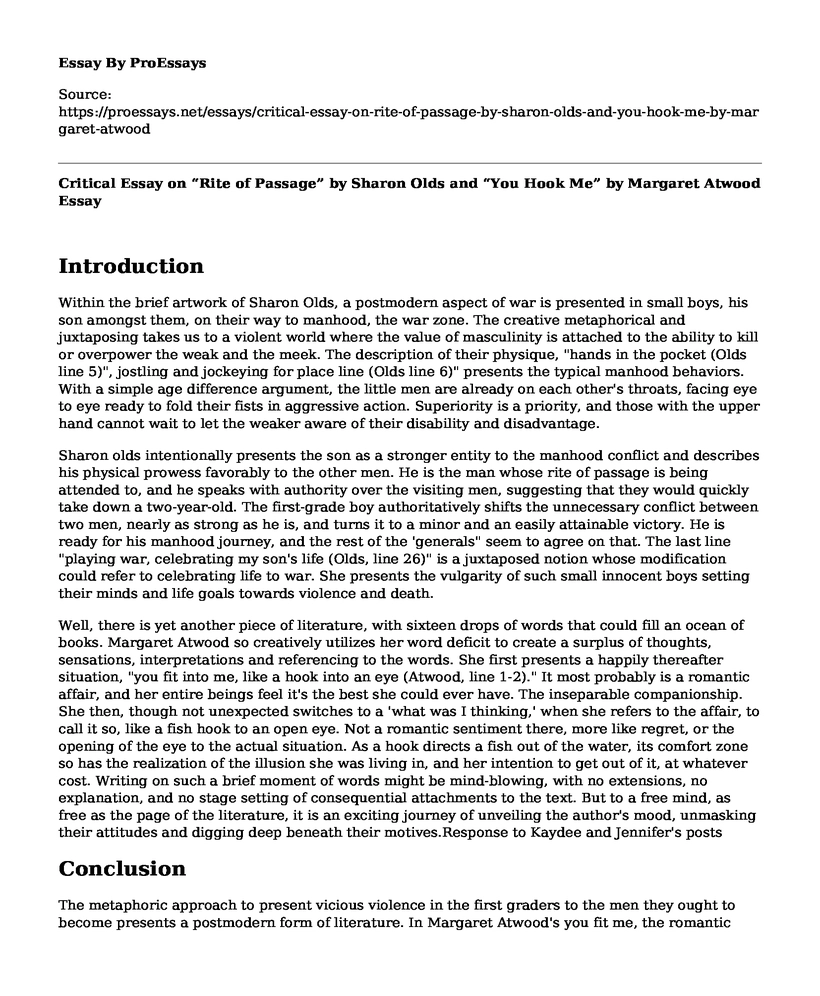Introduction
Within the brief artwork of Sharon Olds, a postmodern aspect of war is presented in small boys, his son amongst them, on their way to manhood, the war zone. The creative metaphorical and juxtaposing takes us to a violent world where the value of masculinity is attached to the ability to kill or overpower the weak and the meek. The description of their physique, "hands in the pocket (Olds line 5)", jostling and jockeying for place line (Olds line 6)" presents the typical manhood behaviors. With a simple age difference argument, the little men are already on each other's throats, facing eye to eye ready to fold their fists in aggressive action. Superiority is a priority, and those with the upper hand cannot wait to let the weaker aware of their disability and disadvantage.
Sharon olds intentionally presents the son as a stronger entity to the manhood conflict and describes his physical prowess favorably to the other men. He is the man whose rite of passage is being attended to, and he speaks with authority over the visiting men, suggesting that they would quickly take down a two-year-old. The first-grade boy authoritatively shifts the unnecessary conflict between two men, nearly as strong as he is, and turns it to a minor and an easily attainable victory. He is ready for his manhood journey, and the rest of the 'generals" seem to agree on that. The last line "playing war, celebrating my son's life (Olds, line 26)" is a juxtaposed notion whose modification could refer to celebrating life to war. She presents the vulgarity of such small innocent boys setting their minds and life goals towards violence and death.
Well, there is yet another piece of literature, with sixteen drops of words that could fill an ocean of books. Margaret Atwood so creatively utilizes her word deficit to create a surplus of thoughts, sensations, interpretations and referencing to the words. She first presents a happily thereafter situation, "you fit into me, like a hook into an eye (Atwood, line 1-2)." It most probably is a romantic affair, and her entire beings feel it's the best she could ever have. The inseparable companionship. She then, though not unexpected switches to a 'what was I thinking,' when she refers to the affair, to call it so, like a fish hook to an open eye. Not a romantic sentiment there, more like regret, or the opening of the eye to the actual situation. As a hook directs a fish out of the water, its comfort zone so has the realization of the illusion she was living in, and her intention to get out of it, at whatever cost. Writing on such a brief moment of words might be mind-blowing, with no extensions, no explanation, and no stage setting of consequential attachments to the text. But to a free mind, as free as the page of the literature, it is an exciting journey of unveiling the author's mood, unmasking their attitudes and digging deep beneath their motives.Response to Kaydee and Jennifer's posts
Conclusion
The metaphoric approach to present vicious violence in the first graders to the men they ought to become presents a postmodern form of literature. In Margaret Atwood's you fit me, the romantic tragedy, commencing with real love and ending in heartbreak is the most conventional modernity. The fish hook into an open eye can be the opening of the eye towards the reality of the romantic situation, which at its core isn't romantic at all, or the discomfort within the companionship, with the case of having a hook dig deep into the eyeball.
Works Cited
Olds Sharon. Rite of passage. Poetry Foundation. 2004. 61 West Superior Street,
Atwood Margaret. You hook me. Power politics. 1971. Lines 1-4 Chicago. Lines 1-26.
Cite this page
Critical Essay on "Rite of Passage" by Sharon Olds and "You Hook Me" by Margaret Atwood. (2022, Jun 19). Retrieved from https://proessays.net/essays/critical-essay-on-rite-of-passage-by-sharon-olds-and-you-hook-me-by-margaret-atwood
If you are the original author of this essay and no longer wish to have it published on the ProEssays website, please click below to request its removal:
- Darkness Visible by Styron - Book Review Example
- Tom Jones Novel Essay
- Class in Evelina by Burney Essay Example
- An Essay on Joyce James' Eveline Using Karen Horney's Neurosis Theory
- Essay Sample on The Art of Hip-Hop Poetry: Rhyme, Cadence & Performance
- Essay Example on The Tell-Tale Heart: Edgar Allan Poe's Study of Guilt and Reason
- Essay Example on Hamlet's Unrequited Love for Ophelia: A Tragic Tale







